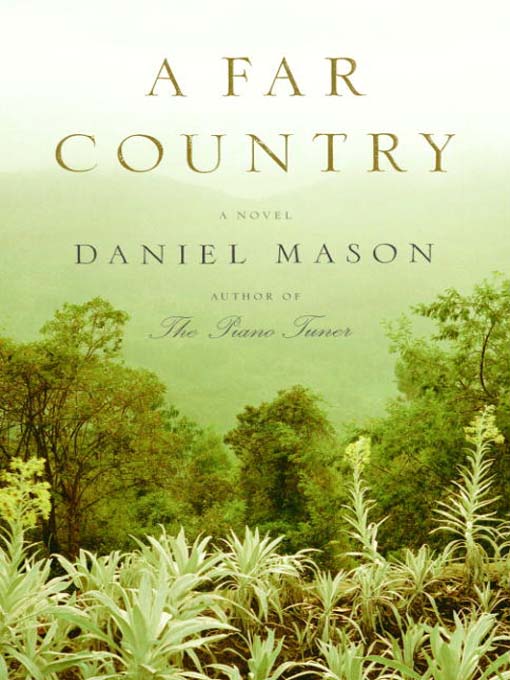
A Far Country
A Novel
کتاب های مرتبط
- اطلاعات
- نقد و بررسی
- دیدگاه کاربران
نقد و بررسی

December 18, 2006
In this flat but intermittently intriguing follow-up to his bestselling debut, The Piano Tuner
, Mason takes readers to two impoverished locales in an unnamed, possibly South American (and heavily Catholic) country: a rural area known as the backlands, and the Settlements, the poor outskirts of a large city. When drought and deprivation become overwhelming in the backlands, 14-year-old Isabel is sent by her family to live with relatives in the Settlement. Her older brother, Isaias, moved to the city several months earlier, and Isabel expects a happy reunion; however, he has gone missing. As Isabel tends to her cousin's baby and adjusts to the chaotic city life, the search for Isaias becomes her obsession, demanding all of her resources—including what may be psychic powers. The story's settings fail to evoke a distinct world; the backlands seem taken from the 1930s American Dust Bowl, while the city—with its nonspecific political corruption, simmering class tensions, and the popularity of saints, soccer and soap operas among its residents—is a grab bag of regional clichés. Mason's strength is in description, and though his accounts of severe weather reach a visceral peak, Isabel is primarily an observer. Readers may be wooed by the prose, but the story is a snoozer.

June 1, 2007
Adult/High School -A poetic meditation on poverty, development, and the unwavering strength of family ties among the rural poor in the Third World. Set in an unnamed Latin nation, this novel chronicles the search by a 14-year-old for her older brother, who has moved to the city for a better life. The two grew up near a sugarcane plantation, and Isabel cherishes the memory of Isaias taking her on long walks in the hills, where he would find wild cactus fruit and brush off the dirt before giving it to her, or jump into the plants to pick a pink flower. One day, after he reluctantly starts working in the fields, she is ordered to find him. Dwarfed by the tall sugarcane, she is soon lost, but seems to have an uncanny ability to "see through" and locate Isaias. After Isabel sees a spirit in the fields, her mother fears the girl is an "open" person, poised between two worlds, and takes her to a healer, who attempts to "close" her. With exquisite prose and a subtle nod to magical realism, Mason helps readers experience the starvation that causes Isabel and her parents to eat dirt, as well as the discarded tires and chaotic noise of the city. This is a quiet novel for teens who want to understand the poverty that can rend families apart and one girl's determination to see hers whole again. Isabel's journey is one that everyone will understand and no one will forget.Pat Bangs, Fairfax County Public Library, VA
Copyright 2007 School Library Journal, LLC Used with permission.

March 15, 2007
After the lush and intricate plotting of his debut, The Piano Tuner, Mason returns with a story that stylistically stands in stark contrasta welcome sign that this novelist doesn't care to repeat himself. There's trouble in St. Michael in the Cane, a small town in an unnamed Third World country overwhelmed by drought and the machinations of rich men who pretend the land is theirs. Young Isabel is so deeply attached to her older brother, Isaias, that she can locate him anywhere in a huge stand of sugarcaneevidently, she's got a sixth sense, something troublesome that her family tries to shut off. There's no other magic in their grim lives, except perhaps Isaias's gift for playing the fiddle, which takes him to the big city to earn some money. He returns with a bit of cash, then disappears again, and as the family's fortunes plummet, Isabel is sent to the city to find him. Although beautifully crafted, this is a painful read about people whose lives are as shriveled as plants starched by the relentless sun. Mason should be applauded for ducking easy sentiment, but some readers may find the stubborn despair unedifying. For larger collections. [See Prepub Alert, LJ 11/1/06.]Barbara Hoffert, Library Journal
Copyright 2007 Library Journal, LLC Used with permission.

November 15, 2006
This highly anticipated second novel from Mason, following " The Piano Tuner" (2002), doesn't disappoint. Once again Mason employs his unusual, remarkable prose style to tell of a journey of discovery. Fourteen-year-old Isabel, born with the gift of "seeing farther, hearing better," lives on the edge of a sugarcane plantation in an unnamed Third World country. Land grabbing by government officials and a long drought have turned the people in her small, close-knit village sullen and silent. Reduced to mixing soil into their food in order to have enough to eat, Isabel's parents, desperate for income, decide to send her to the city to live with her cousin and her adored older brother, Isaias. But Isabel finds that the city is far from the paradise she envisioned; the people live in crowded shantytowns with polluted air and water and under constant threat of violence. Worst of all, her brother, rumored to be working as a musician, has not been seen for weeks. As Isabel attempts to find her brother, she must deal with both the contempt of the rich and the pity of city bureaucrats, but she never loses her determination or her sense of self-worth. Mason invests his story with all the power of a fable, one that gives Isabel's personal bravery its due while also relaying the timelessness of human suffering.(Reprinted with permission of Booklist, copyright 2006, American Library Association.)

























دیدگاه کاربران